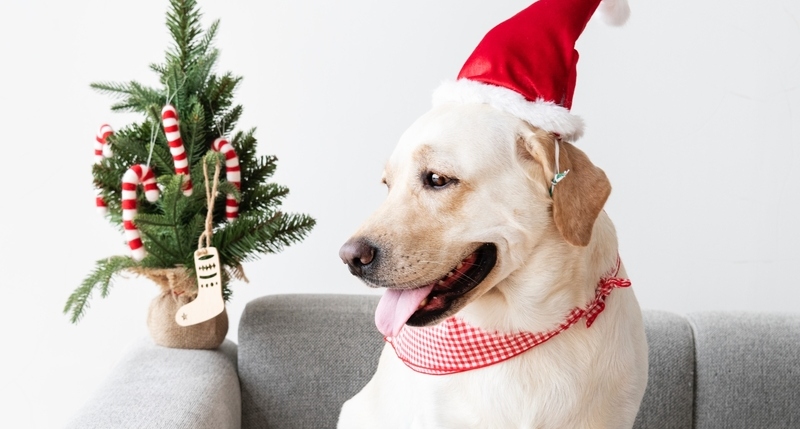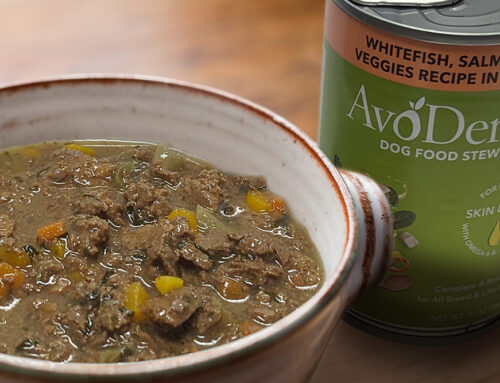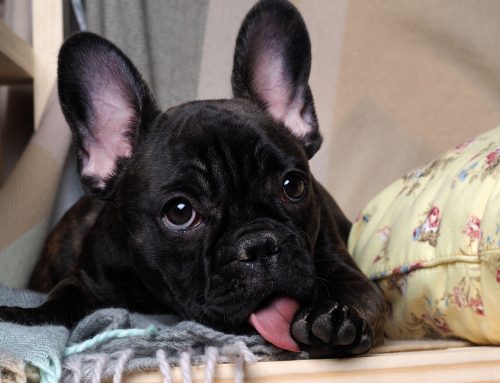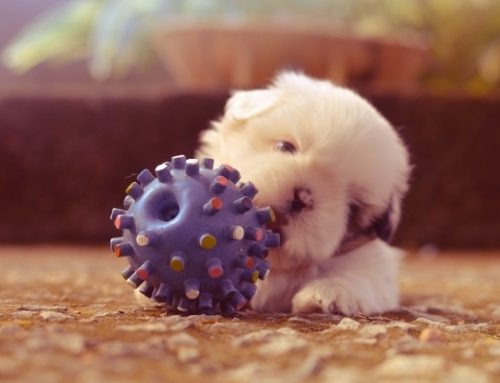Not every dog is as excited as you might be to have a household full of family and guests visiting for the holidays. Preparing your dog for parties or dinners involves patient training and an honest assessment of how she behaves around groups of both familiar faces and strangers.
Why Dogs Bark At Guests
Dogs bark at guests for many different reasons. She might be scared or overly excited by each doorbell ring. For some dogs, all of the commotion around the holidays causes nervousness and stress. For others, it can seem like an invasion of strangers, leading them to act defensively. Whether or not you expect your group to be loud or otherwise startling to your dog, they’ll still have an effect on your her routine.
Your dog might bark at the front door for every delivery person or loud car that drives by. You can train a frightened dog to react more calmly to people at the door by using treats and lots of calm petting to create positive associations with the doorbell. Or, you can begin teaching an over-excited dog to greet guests calmly by ignoring her attention-seeking behavior.
A tasty treat will show her she’s behaving well and can further calm her nervousness. Soft, classical music has been shown to soothe dogs, as well. Try playing some quiet background music in your dog’s safe room as an extra calming factor.
If your dog is very friendly with strangers but doesn’t like the doorbell, you can introduce her to the guests once they’ve all arrived. Overexcited pooches will require a bit more training and preparation to be able to handle a holiday crowd.
Preparing your dog for holiday guests means being ready to train both your dog and your guests about how to behave toward each other.
How to Calm Your Dog Down When Guests Come Over
Train Your Dog Before The Holidays.
It’s best to train her in the weeks leading up to the holidays. Teach her simple commands and make sure she’s comfortable with being petted anywhere kids might pet her. Do plenty of exercise with your dog on the day your visitors will arrive and keep her entertained with toys and chewy treats.
Engage in Active Play Before the Party.
Another key to a calm dog is doing lots of exercise with her prior to the visitors’ arrival. Extra walking or playing fetch during the days and hours before your dinner or party can help her expend some energy and feel more relaxed while you’re distracted by guests.
Have Guests Give Your Dog a Present.
If you’re having a holiday party that involves a gift exchange, ask your family or friends to bring a small toy as an extra gift for your dog! She’ll love the attention and make a positive association with new people entering the house. Or, you can introduce each guest to your dog with a small piece of a treat for the same effect.
Distract Your Dog With A Toy
Distractions, including toys and long-lasting chews, are always useful in keeping your dog occupied while you’re busy hosting. You’ll also help her feel calmer if you stick to her normal schedule as closely as possible. Try to feed her at the usual times and maintain her walking schedule.
Create a Safe Quiet Space.
Of course, you don’t want these toys and treats to seem like rewards for wild behavior. If she’s simply too excited by all of the activity, it’s better to move her to the safe room for a time to help her calm down. This is a special spot where your dog won’t have to interact with every guest that enters the house and is especially useful during the holidays, when the stream of visitors can be overwhelming.
A doggie safe room is a place where your dog can be away from all of the activity. You can move your dog’s bed or crate into a bedroom, laundry room, or other low-traffic but comfortable area. Give her a favorite toy to play with and don’t forget to check on her frequently, petting her and praising her good behavior. You can also use a baby gate to create a safe section of the house.
Train Your Dog For the Holidays
The best way to prepare is to train your dog gradually during the time leading up to the holidays (or any large party). Simple commands like “sit” and “stay” can make a huge difference in a dog’s behavior around house guests. Every dog owner knows how embarrassing it can be when their dog jumps all over a guest who’s not used to animals. Training your dog to obey vocal commands will help both her and your guests feel more comfortable around each other.
You can train her to sit with treats and use regular meal times to teach her to stay until she’s called to her food bowl, for example. Then, you can move on to other commands, such as “leave it” for food from the table and “place” to send her to her safe spot.
Train Your Holiday Guests
Training your guests is as important as training your dog. Kids, especially, need to be monitored whenever they’re interacting with your pet. Don’t be afraid to remove your dog from any situation where a child is making her nervous (probably unintentionally). A young child might not understand, but you can gently explain that your dog needs her quiet time and that she’ll be back later when you’re available to supervise.
As the host, you’re in charge of your house and you know your dog better than anyone. Paying attention to her behavior and watching for signals of discomfort can help you keep her out of stressful situations. Explain to guests who haven’t met your dog before what she likes and doesn’t like. You’ll help avoid awkward situations for yourself and your guests if everyone knows how to behave towards their furry co-host.
Young puppies require much more attention during large gatherings. Puppies’ high energy levels make them more likely to become overexcited or frightened when guests enter the house. A puppy might not be trained enough to sit when told, either. And, as you can imagine, every guest will want to see your new puppy! You’ll have to be prepared to handle your guests interacting with her all at once. Still, this can become stressful for both of you.
It’s important to make your guests aware of how you’re training the puppy to make sure they’re not table feeding your dog or leading her into unwanted behavior in other ways.
It might be better to put her in her safe room until all of the guests have arrived and settled down. Then, you can take them one or two at a time to meet your newest family member. Or, if she seems comfortable, you can bring her into the main room.
There is one more circumstance that might stress a dog owner more than any other around the holidays: visiting family who bring their own dog with them. While this can be a fun and exciting experience for everyone, it can also be an overwhelming change for some dogs.
You can make a good introduction by taking your dogs on a walk together, giving them more space in which to get accustomed to each other. They’ll also get to see their humans being friendly and loving toward one another.
A pet-friendly holiday starts with good preparation, patient training and established house rules. By teaching your dog to behave around guests and explaining to your guests how to treat your dog, you can ensure that everyone feels calm and comfortable with each other.
Sources
- Blake, Mychelle. “Preparing Your Dog for Holiday Guests.” Pet Health Network, IDEXX, 22 Oct. 2017.
- Geier, Elisabeth. “How to Stop Your Dog from Barking at the Doorbell.” The Dog People, Rover.com, 29 May 2018.
- Parks, Shoshi. “How Do I Keep My Dog Calm Around Guests?” The Dog People, Rover.com, 29 May 2018.
- Villarreal, Jill. “Ask the Expert: How Do I Prepare My Dog for Holiday Guests?” The Noseprint, Big Heart Pet, Inc.
AvoDerm is a registered trademark of Central Garden & Pet Company.





